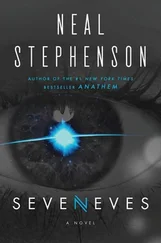“Can we go to the roof?” Peter asked.
A scout ascended to the roof and reported back via walkie-talkie that none of the REAMDE boys were hanging out there at the moment. So Peter and Zula, accompanied by Sokolov, climbed six stories to the top of the stairway. Access to the roof had formerly been sealed off by a door, but the lock had been jimmied.
The Troll’s terrace consisted of half a dozen plastic injection-molded chairs, a rusty folding table, a basketball hoop held up by a scaffolding made from plumbing parts, a tea service, a plastic tub containing a stack of magazines about the NBA, and an extension cord that trailed across the roof into the stairwell and was patched into the remains of a light fixture.
From that same light fixture, a length of cheap two-strand lamp cable ran up to the roof of the little shack that topped the stairwell, where it disappeared under a plastic bucket held in place with a brick. A blue Ethernet cable also went under that bucket.
Peter got a leg up from Sokolov, vaulted to the top of the shack, squirmed over to the bucket, removed the brick, and tilted it back to reveal a Wi-Fi device, green LEDs twinkling merrily.
The blue Ethernet cable ran from it across the roof to the front of the building, then disappeared through a drain hole in the roughly meter-high parapet. Zula followed the cable to the edge, leaned over the parapet, and peered down. She was now standing near the corner of the building diagonally opposite to where they had exited the van.
Sixty feet below her, she could see the van parked in front of the building’s main entrance, blocking traffic and creating controversy.
The blue cable had been tucked in alongside a vertical drainpipe that ran from the drain hole in the parapet down the front of the building. At some point the cable presumably peeled away from the drainpipe and entered the building through a window or some other opening, and that would mark the location of the Troll’s apartment. In a perfect world they would have been able to see that place from this vantage point and immediately pick out the apartment in question, but no such luck; it must be hidden beneath some horizontal feature that was blocking their view. And what with all the balconies, clotheslines, awnings, and external plumbing, there were plenty of those.
Not for the first time, Zula corrected herself: no, it was good luck, not bad, that they couldn’t figure it out; turning the Troll over to Ivanov would be a bad thing. She was a little perturbed by how easy it was for her to get caught up in the excitement of the hunt.
Peter drifted over to her, fixated on the screen of a PDA. “The name Golgaras mean anything to you?”
“It is the name of one of the continents of T’Rain,” Zula said.
“How about Atheron?”
“Same.”
“I’m picking up four Wi-Fi access points,” Peter said. “Two of them are set to the default names and have really weak signals—I’ll bet they are in that building across the street. Golgaras is very strong, and Atheron is considerably weaker.”
“Try unplugging that Wi-Fi unit under the bucket,” Zula suggested, “and see if one of them goes dead.”
Peter turned and headed back to the stairwell to try the experiment.
Zula had become interested in a bundle of improvised wiring that joined this building to the one across the street with the scaffolding and the blue tarps. It was connected to the front wall almost directly below her between the fourth and fifth stories. It was not attached at any one point but rather involved with the building through a spreading and ramifying root system. Zula was able to make out a single strand of blue Ethernet cable spiraling lazily around the outside of the bundle: the last piece of wire to have been added.
“Ivanov requests status report,” said Sokolov, who had crunched up behind her on the pea gravel. He had plugged an earpiece into his walkie-talkie.
“I think it’s in this corner of the building,” Zula said. “Below us somewhere. I’m going to guess it’s on the fourth or the fifth floor.”
Sokolov relayed this into a microphone clipped to his shirt collar.
“Golgaras went dead,” Peter reported. “Atheron is still transmitting.”
“Meaning?” Sokolov asked.
“We think that they have two WAPs,” Peter said. “One up here on the roof and probably one in their apartment.”
Sokolov put his hand to his ear and listened, then asked: “Ivanov asks: What is basis for guess of this corner?”
Zula directed his attention to the wire bundle below them. Peter and Sokolov bent over the parapet and saw what she had seen.
“We could narrow it down more,” Peter volunteered, “if we could get a look at the building from the front. See where the blue wires enter the structure.”
Sokolov relayed that. There was a short pause.
“Fuck,” Sokolov said in English, and looked down. On his face, anger was mixed with something like embarrassment.
Zula and Peter followed his gaze and saw Ivanov emerging from the passenger seat of the van. He went around to the side door, opened it up, rummaged around for a minute, and pulled out a pair of binoculars, which he pressed to his face and aimed up their way.
Sokolov recoiled from the parapet and reached out to grab Peter and Zula, but they were already following, dropping down low where they couldn’t be seen from the street.
“He is insane,” Sokolov said, quite matter-of-factly, as though remarking that Ivanov was 1.8 meters in height. He certainly did not say it in the ironic admiring way that a certain type of young American male might have done. But before he could elaborate on the topic, his eyes went out of focus as he received a transmission from Ivanov.
“We go down now,” Sokolov said.
They met Ivanov in the cellar. He had taken a phone picture of what, from his standpoint, had been the upper left quadrant of the building’s façade. Of course the screen of his phone could not even come close to resolving an object as slender as an Ethernet cable from that distance, but he was able to point out the place where, with the help of his binoculars, he had seen both of the blue wires entering the building: a small hole, most likely a vent for a kitchen fan, above the fourth story and below the fifth.
They counted the windows between the corner of the building and the location of that hole. Then they sent a security consultant up to one of the lower floors (assuming that they all had the same layout) and had him go all the way to the end of the corridor and then count doors back from there, noting the apartment numbers on the doors.
As this was going on, Zula managed to peel Csongor off from the center of discussion. “Yuxia is out there alone in the van!” she exclaimed. “If we could get to her—”
Csongor shook his head. “Ivanov took the keys from the ignition,” he said. “They are in his pocket.”
“Oh.”
“His left front trouser pocket, should that information become somehow relevant.”
“Still, she could honk the horn—call for help—”
“One of the Russians raised the same issue,” Csongor said, and fell silent.
“And?”
“Ivanov is not worried.”
“Why not?”
“Yuxia called you ‘girlfriend.’ ”
“So?”
“So they think maybe you and Yuxia are lesbians.” Csongor blushed to an extent visible even in the dimly and bluely lit basement.
“Holy crap,” Zula said. “Tomorrow remind me to have a good laugh about that if I haven’t been tortured to death.”
“But I think that this ‘girlfriend’ is a way that black women greet each other, even if they are heterosexuals.” Something about the look on Csongor’s face indicated that this wasn’t just a foray into urban American slang but that it was of possible direct bearing on his future happiness. Zula permitted herself a moment of amazement on how the male reproductive drive could obtrude on situations where it was worse than useless. She even considered telling a little white lie.
Читать дальше





